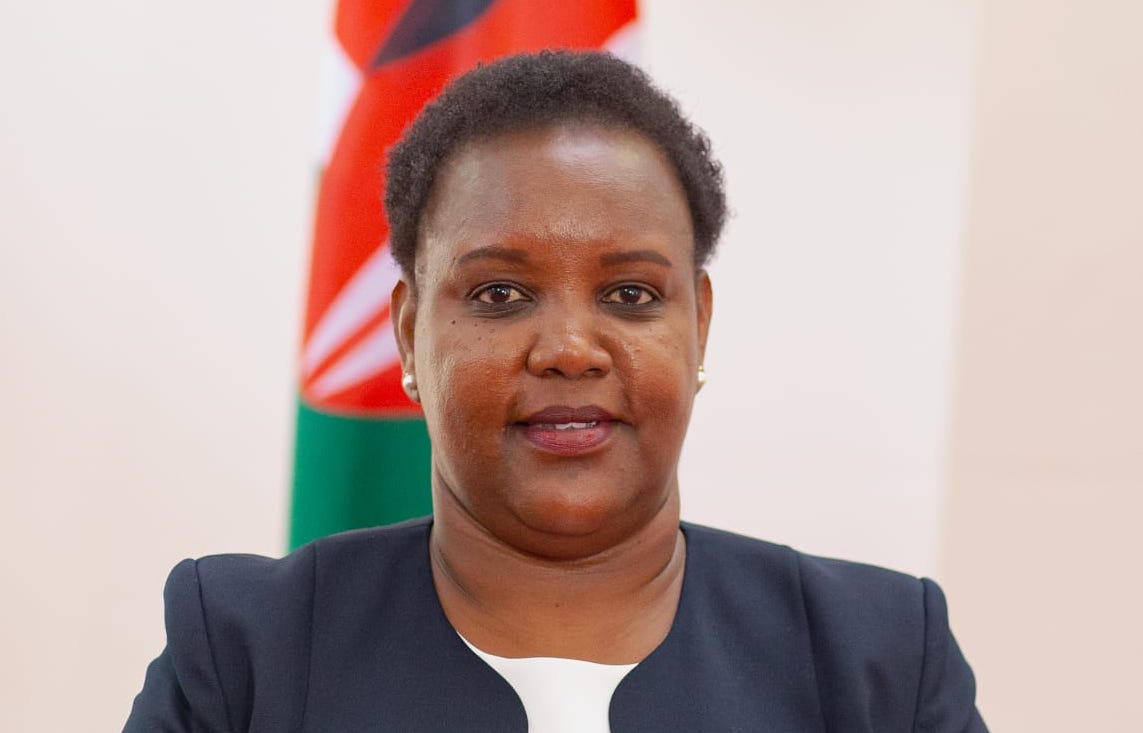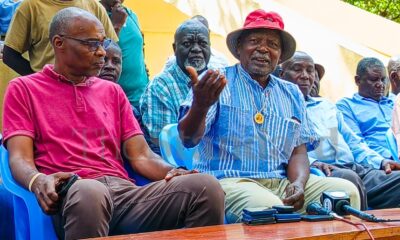News
Questions Swirl as Former Labour CS Bore’s Wealth Swells by Sh102 Million in Three Years
While ordinary Kenyans grapple with punishing inflation, a depreciating shilling, and an economy that grew at a modest 5.6 percent last year, Ms Bore’s personal wealth expanded at nearly three times the national economic growth rate.

Eyebrows raised as Florence Bore’s wealth jumps 51 percent during tenure, reigniting debate on unexplained riches among State officials
The staggering speed at which former Cabinet Secretary for Labour and Social Protection Florence Bore accumulated wealth during her time in government has thrust the spotlight back on Kenya’s toothless framework for monitoring how public officials amass their fortunes.
In just three years, Ms Bore’s declared net worth ballooned from Sh200 million in October 2022 to Sh302 million as she prepares to take up her new posting as Kenya’s ambassador to Namibia.
The Sh102 million surge represents a 51 percent jump in wealth, translating to a compound annual growth rate of 14.72 percent—a performance that would make even the savviest private sector investors green with envy.
The mathematics is jarring.
While ordinary Kenyans grapple with punishing inflation, a depreciating shilling, and an economy that grew at a modest 5.6 percent last year, Ms Bore’s personal wealth expanded at nearly three times the national economic growth rate.
The question begging for answers is simple yet profound: How?
Documents tabled before Parliament as part of her vetting for the ambassadorial position reveal that Ms Bore attributed her wealth to income from a family tea and dairy farm, alongside dividends from three Saccos—the Parliamentarians Sacco (Pacoso), Imarisha Sacco, and Kenya Highlands Sacco. But can these sources genuinely account for such exponential growth?
Tea and dairy farming, while potentially lucrative, are notoriously vulnerable to market fluctuations, climate vagaries, and the chronic challenges that plague Kenya’s agricultural sector.
Sacco dividends, meanwhile, typically yield modest returns, hardly the stuff of which fortunes are made in three short years.
The opacity surrounding Ms Bore’s wealth accumulation epitomizes a systemic rot that has turned wealth declaration from a tool of accountability into a meaningless bureaucratic ritual.
The Public Officer Ethics Act of 2003 mandates all public officials to declare their wealth every two years, ostensibly to deter corruption and illicit enrichment. Yet this requirement has become little more than a paper tiger.
As the Kenya Institute for Public Policy Research and Analysis pointedly observed in a recent review, wealth declarations have been “kept secret and not subject to public scrutiny,” making it virtually impossible to hold anyone accountable.
Without verification mechanisms or consequences for suspicious wealth growth, the declarations serve only to legitimize what might otherwise attract uncomfortable scrutiny.
Ms Bore is hardly an outlier. The nine nominees recently approved as ambassadors collectively declared wealth totaling Sh871 million. Joseph Musyoka, headed to Saudi Arabia, declared Sh137 million.
Edwin Afande, bound for Austria, claimed Sh125 million. Antony Muchiri, the former Public Service Commission chair now destined for Turkey, is worth Sh86 million by his own account.
These figures raise uncomfortable questions about the diplomatic service becoming a retirement package for the politically connected, rather than a meritocratic posting for career foreign service officers.
When did wealth accumulation become a credential for representing Kenya abroad?
The broader context makes Ms Bore’s wealth growth even more troubling. Her tenure at the Ministry of Labour and Social Protection coincided with a period when procurement scandals erupted across multiple government ministries, with billions of shillings vanishing into opaque deals.
While there is no suggestion of wrongdoing on her part, the timing invites legitimate public interest in understanding how she managed such impressive financial growth.
What were her investment strategies? Did she receive consultancy fees or board appointments that supplemented her Cabinet salary? Were there business ventures that proved particularly profitable? These are not impertinent questions—they are essential inquiries in a democracy where public officials must withstand scrutiny.
The trouble is that our legal framework provides no mechanism for such interrogation.
Unless criminal investigations are launched—which rarely happens absent a political motive—wealth declarations disappear into filing cabinets, gathering dust until the next perfunctory submission is due.
This culture of impunity around unexplained wealth feeds public cynicism about government and corrodes trust in public institutions.
When Kenyans see their leaders amassing fortunes while the country struggles with a debt crisis partly attributed to corruption, it breeds the kind of disillusionment that can destabilize a nation.
President William Ruto’s administration came to power promising to tackle corruption with unprecedented vigor.
Yet appointments like Ms Bore’s to plum diplomatic postings, despite questions about her rapid wealth accumulation, send a contradictory message.
It suggests that wealth growth however inexplicable is no barrier to advancement in government service.
Parliament, for its part, has shown itself to be a compliant rubber stamp rather than a vigilant watchdog.
Lawmakers approved Ms Bore and her fellow nominees without demanding detailed explanations for their wealth trajectories. This abdication of oversight responsibility makes them complicit in a system that privileges the connected over accountability.
What Kenya desperately needs is a radical overhaul of wealth declaration requirements. Declarations should be made public by default, not hidden behind walls of secrecy.
They should be subject to independent verification, with forensic auditors examining the plausibility of claimed sources.
And there should be consequences real consequences for officials whose wealth growth cannot be adequately explained.
Until such reforms materialize, cases like Ms Bore’s will continue to exemplify how easily public service can become a pathway to private enrichment.
Her Sh102 million windfall in three years is not just a personal success story—it is a symptom of a diseased system that treats public accountability as an optional extra rather than a fundamental requirement.
As she prepares to represent Kenya in Namibia, Ms Bore leaves behind more questions than answers.
In a country where the average civil servant earns barely enough to survive, her meteoric wealth accumulation stands as a stark reminder of the chasm between those who govern and those who are governed.
It is a chasm that grows wider with each unexplained fortune, each unanswered question, each failure to demand accountability.
The time for uncomfortable questions is now. The people of Kenya deserve nothing less.
Kenya Insights allows guest blogging, if you want to be published on Kenya’s most authoritative and accurate blog, have an expose, news TIPS, story angles, human interest stories, drop us an email on [email protected] or via Telegram
-

 Business2 weeks ago
Business2 weeks agobetPawa Empire Crumbles: Mr Eazi’s Betting Gambit Unravels Amid Partner’s Shadowy Deals
-

 Business1 week ago
Business1 week agoMinnesota Fraud, Rice Saga, Medical Equipment Deal: Why BBS Mall Owner Abdiweli Hassan is Becoming The Face of Controversial Somali Businessman in Nairobi
-

 Business2 days ago
Business2 days agoCooking Fuel Firm Koko Collapses After Govt Blocks Sh23bn Carbon Deal
-

 Politics1 week ago
Politics1 week agoYour Excellency! How Ida’s New Job Title From Ruto’s Envoy Job Is Likely to Impact Luo Politics Post Raila
-

 News1 week ago
News1 week agoDCI Probes Meridian Equator Hospital After Botched Procedure That Killed a Lawyer
-

 Investigations2 weeks ago
Investigations2 weeks agoEXPOSED: SHA Officials Approve Higher Payments for Family, Friends as Poor Patients Pay Out of Pocket
-

 News1 week ago
News1 week agoKenya Stares At Health Catastrophe As US Abandons WHO, Threatens Billions In Disease Fighting Programmes
-

 Politics2 weeks ago
Politics2 weeks agoJaramogi Clan Tells Raila Jr, Winnie Against Disrespecting Their Uncle Oburu, Warns of Curses















